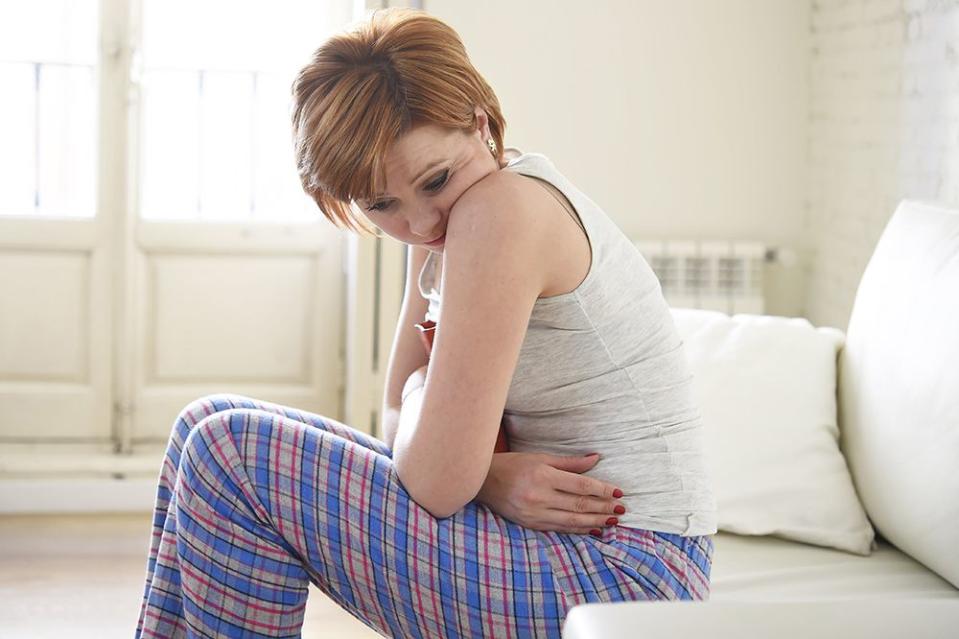How to Manage Constipation in Pregnancy
Nearly three out of four people experience constipation and other bowel disorders during pregnancy. Here's how to handle it.

Noticing a flutter or two in your belly lately? It's not necessarily your baby kicking. Thanks to pregnancy hormones and an enlarged uterus, you might start feeling bloated, constipated, and generally uncomfortable. Constipation can also lead to hemorrhoids, another common side effect of pregnancy. Here's how to manage and prevent constipation while expecting.
Causes of Pregnancy Constipation
Constipation during pregnancy can feel a bit like a mystery; even if you don't eat foods that would typically make you feel bloated and backed up, there are still potential causes lurking around that can lead to constipation. Here are a few common causes of constipation to be on the lookout for.
Hormones
Pregnant people experience constipation partly because of high levels of progesterone. "This hormone causes the muscles in the wall of the bowel to relax, so they're not making the contractions needed to help move things along," says Dr. Sara Rabin-Havt, M.D., associate professor of clinical obstetrics and gynecology and women's health at the Albert Einstein College of Medicine, in New York City. "Plus, as your pregnancy progresses, your uterus enlarges and presses down on your bowels, which can slow their ability to empty."
Iron
Yet another culprit may be the iron in your prenatal vitamin or the iron supplement you may take because of anemia. A comprehensive analysis of clinical studies on iron supplements has shown that they can cause several gastrointestinal issues, including constipation. This may be because iron "feeds" harmful bacteria in the large intestine, which can cause bloating and lead to constipation.
Iron supplements can also increase morning sickness symptoms. If you're feeling backed up or queasy, it might be time to talk to your doctor about an alternative source of iron.
Caffeine
Giving up caffeine, which naturally keeps the bowels moving, can be another cause of constipation. If you're a devoted coffee drinker who suddenly gave it up once you became pregnant, your body may need some time to adjust.
Hydration and Fiber
To stay regular, it helps to stay hydrated and eat plenty of fiber. Research has shown that eating a diet high in fiber, like fruits and vegetables, and drinking plenty of water can help increase a healthy gut biome, preventing constipation—even during pregnancy.
So when does constipation in pregnancy start? It can appear around the second or third month, and it may stick around until your baby makes an appearance.
The Link Between Constipation and Hemorrhoids
On its own, pregnancy increases your risk of swollen veins around your rectum. "But if your stool is uncomfortable to pass and you're straining to do so, it can make hemorrhoids worse," says Shari Brasner, M.D., assistant professor of obstetrics and gynecology at Mount Sinai School of Medicine in New York City, and author of Advice from a Pregnant Obstetrician (Hyperion.) "This is serious because they can be with you for life."
Constipation leads to hemorrhoids because of straining while trying to evacuate your bowels. All that straining can put pressure on veins, leading to bulging. But don't worry; using the tips below, you can prevent pregnancy hemorrhoids by managing constipation.
Related:What's Up With Pregnancy Hemorrhoids?
Constipation in Pregnancy Treatment and Prevention
If constipation is your issue, there are a few ways to get things moving again. Here are some tips from the American Congress of Obstetricians and Gynecologists (ACOG)'s consumer pregnancy book, Your Pregnancy and Childbirth Month to Month.
Drink plenty of liquids, especially water and prune juice or other fruit juices.
Eat high-fiber foods, such as fruits, vegetables, beans, whole-grain bread, and bran cereal. Aim for about 25 grams each day.
Walk or do another safe exercise every day. A simple walk around the block will help things get moving.
Try eating smaller meals more frequently.
Ask your doctor about bulking agents such as FiberCon, which adds fiber and water to your digestive system, or stool softeners.
Here's the good news: bowel problems don't really affect a pregnant person's quality of life all that much. But if you've been spending more (or less) time in the bathroom than usual lately, at least you know you're not alone!

